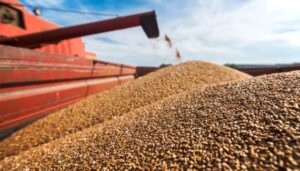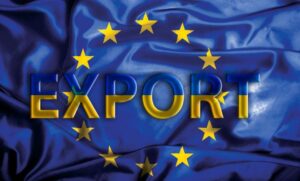
In January-June this year, Ukrainian companies increased imports of copper and copper products in value terms by 33.4% year-on-year to $75.101 million.
According to customs statistics released by the State Customs Service of Ukraine on Tuesday, exports of copper and copper products increased by 5.4% to $41.555 million over the period under review.
In June, Ukraine imported copper worth $10.114 million and exported it worth $8.658 million.
In addition, in January-June 2024, Ukraine increased imports of nickel and products by 68.3% compared to the same period in 2023 to $12.954 million (in June – $1.880 million), aluminum and aluminum products by 24.1% to $208.745 million (in June – $36.852 million).
At the same time, it reduced imports of lead and lead products by 3.9% to $560 thousand (in June – $137 thousand), imports of tin and tin products increased by 19.5% to $1,350 million (in June – $330 thousand), and increased imports of zinc and zinc products by 37.4% to $28,340 million (in June – $5,110 million).
Exports of aluminum and aluminum products in the first six months of 2024 increased by 12.8% compared to the same period a year earlier to $54.175 million (in June – $10.383 million), lead and lead products decreased by 30.8% to $5.404 million (in June – $1.070 million), nickel and nickel products amounted to $422 thousand (in June – $180 thousand), while in January-June 2023 it was $125 thousand.
Zinc exports for the first six months of this year amounted to $98 thousand (in June – $14 thousand), while in January-June 2023 it was $72 thousand. Exports of tin and products amounted to $181 thousand (in June – $35 thousand) against $52 thousand in the same period a year earlier.
As reported, in 2023, Ukraine increased imports of copper and copper products by 2.2 times compared to 2022 – up to $140.795 million, while exports decreased by 20.1% to $72.078 million.
In addition, in 2023, Ukraine decreased imports of nickel and products by 74.2% compared to 2022, to $15.391 million, and increased imports of aluminum and aluminum products by 7.7%, to $366.463 million.
At the same time, it reduced imports of lead and lead products by 65.2% to $989 thousand, imports of tin and tin products by 23% to $2.728 million, but increased imports of zinc and zinc products by 18.8% to $45.966 million.
Exports of aluminum and aluminum products last year increased by 0.7% compared to 2022 to $97.616 million, lead and lead products increased by 23.5% to $14.778 million, and nickel and nickel products amounted to $532 thousand, while in 2022 it was $1.268 million.
In 2023, the company exported $130 thousand worth of zinc, compared to $1.331 million in 2022. Exports of tin and tin products amounted to $159 thousand against $424 thousand in 2022.

In January-June of this year, Ukrainian mining companies increased exports of iron ore in physical terms by 2.2 times compared to the same period last year, to 18 million 315.164 thousand tons.
According to the statistics released by the State Customs Service on Tuesday, foreign exchange earnings from iron ore exports increased by 78.8% to $1 billion 602.255 million over the period.
Iron ore was exported mainly to China (38.66% of supplies in monetary terms), Slovakia (16.46%) and Poland (15.83%).
In January-June 2024, Ukraine imported iron ore worth $151 thousand in the total amount of 330 tons, while in January-June 2023 it imported iron ore worth $42 thousand in the total amount of 68 tons. Imports this year were carried out from the Netherlands (47.02%), Italy (19.87%) and Norway (18.54%).
As reported, in 2023, Ukraine decreased exports of iron ore in physical terms by 26% compared to 2022 – to 17 million 753.165 thousand tons, foreign exchange earnings from iron ore exports amounted to $1 billion 766.906 million (down 39.3%). Iron ore was exported mainly to Slovakia (28.39% of supplies in monetary terms), the Czech Republic (19.74%) and Poland (19.56%).
Last year, Ukraine imported iron ore worth $135 thousand in the total amount of 250 tons. During this period, imports were made from Norway (34.81%), Italy (28.89%) and the Netherlands (28.89%). While in 2022, iron ore was imported for $65 thousand in a total volume of 101 tons.

In January-June this year, Ukrainian enterprises increased exports of ferrous scrap by 35.3% year-on-year to 124,527 thousand tons from 92,048 thousand tons.
According to statistics released by the State Customs Service on Tuesday, 22.161 thousand tons were exported in June, 14.952 thousand tons in May, 26.153 thousand tons in April, 20.907 thousand tons in March, 23.194 thousand tons in February and 17.160 thousand tons in January.
In monetary terms, scrap metal exports increased by 45.9% to $39.760 million from $27.259 million.
In January-June, Ukraine exported scrap metal to Poland (84.88%), Greece (11.18%) and Germany (3.77%).
In the first six months of the year, the country imported 501 tons of scrap metal for $ 250 thousand. Imports were carried out from Slovakia (47.01% in monetary terms), Turkey (28.29%) and Poland (11.95%), while in January-June 2023, 458 tons were imported for $180 thousand.
As reported, in 2023, the scrap collecting enterprise of Ukraine increased the export of scrap metal from the country by 3.4 times compared to the previous year – up to 182,485 thousand tons from 53,557 thousand tons. In monetary terms, exports increased 2.74 times to $52.723 million from $19.271 million.
Earlier, Ukrmetallurgprom President Oleksandr Kalenkov stated in a column on the Interfax-Ukraine website that scrap metal is exported through the European Union, which has a preferential export duty of EUR3 per ton, and from there the raw materials are redirected to real customers. He noted that exporting raw materials directly to customers would cost EUR180 in export duties, and the Ukrainian budget has already lost UAH 350 million.
The head of Ukrmetallurgprom called for a temporary ban on the export of ferrous scrap to provide steelmakers with strategically important raw materials in the ongoing war. He also clarified that a ton of scrap metal processed into steel brings in 10 times more to the budget than the EU export duty, which is about $300 per ton.
In 2022, Ukraine reduced exports of ferrous scrap by 11.5 times compared to the previous year, to 53,557 thousand tons, and in monetary terms, it decreased by 12.4 times, to $19.271 million.

Ukraine exported 57.5 mln tonnes of grains and oilseeds in 2023-2024 marketing year, which ended on June 30, 2024, out of the harvest of 82.8 mln tonnes, while the carry-over stocks amounted to about 7 mln tonnes, the Ukrainian Grain Association (UGA) reported.
“Last season, the most important factor for the export of Ukrainian grain was the opening of the Ukrainian Humanitarian Corridor, which allowed exports by sea from the deep-water ports of Odesa region. The second most important factor was the introduction by Ukraine, together with international partners, of a working mechanism for insuring ships entering Ukrainian ports, which reduced the costs of exporters and, accordingly, Ukrainian agricultural producers for export logistics,” the association noted.
According to the UGA analysts, referring to the information of the State Customs Service, in monetary terms, the exports of grains and oilseeds in 2023/2024 MY amounted to $10.76 bln, and exports including products from them, including sunflower oil and other oils, cake and meal – $17.86 bln.
Wheat exports amounted to 18.4 million tons worth $3 billion, with production of about 22 million tons. The top 3 importing countries of Ukrainian wheat were Spain, which purchased 5.899 mln tons, Egypt – 1.721 mln tons, and Indonesia – 1.515 mln tons.
Ukraine exported almost 2.5 mln tons of barley for $376 mln, against the production of 5.8 mln tons. The most active buyers were China – 702 thousand tons, Indonesia – 460 thousand tons, and Cyprus – 221 thousand tons.
Last season, Ukraine exported 29.3 mln tons of corn worth $4.7 bln, compared to last year’s production of 29.6 mln tons. Its main buyers were Spain – 6.011 million tons, China – 4.832 million tons, and Egypt – 3.874 million tons.
Almost 3 mln tons of soybeans were sold to other countries for $1.1 bln, with a harvest of 4.9 mln tons. The top 3 buyers were Egypt – 956 thsd tonnes, Turkey – 674 thsd tonnes, and Germany – 235 thsd tonnes.
Ukraine exported 3.7 mln tons of rapeseed worth $1.4 bln, compared to last year’s production of 4.5 mln tons. The most active buyers were Germany – 1.226 mln tons, Romania – 609 thsd tonnes, and the Netherlands – 420 thsd tonnes.

In January-June 2024, Ukraine exported $10.97 billion worth of goods to the European Union, which is 9.7% less than in the first half of 2023, Deputy Minister of Economy and Trade Representative of Ukraine Taras Kachka said.
“This is an obvious correlation of transportation routes. Exports to the EU decreased the most to neighboring countries – to Poland by 25.7%, to Slovakia by 21.3%, to Hungary by 67.2%, and to Romania by 50.2%. On the other hand, exports to Spain (81.1%), Italy (24.7%), and the Netherlands (22.4%) increased significantly,” he wrote on Facebook.
Kachka pointed out that this correlation makes it possible to clearly see trade with the EU without forced transit to third countries.
“This will allow us to resolve a lot of problems that have accumulated in relations with neighboring countries,” he suggested.
The Ukrainian trade representative emphasized that the existing problems show that in 2022-2024 Ukraine has significantly narrowed the range of “sensitive” goods in trade. Before the war, these included steel, which was subject to trade protection, and 36 categories of agricultural products that were subject to temporary liberalization, or quotas.
He reminded that under the current phase of autonomous trade measures, the number of such sensitive products has been reduced to seven: poultry, eggs, sugar, honey, corn, oats, and cereals.
Commenting on the European Commission’s quotas on Ukrainian sugar and eggs, Kachka noted that active exports from Ukraine have reached certain thresholds.
“If the sugar trade with the EU is suspended to normalize trade in accordance with the decision of the Ukrainian side, the export of eggs will continue. We expect that the general EU quota within the WTO will apply to Ukrainian products and a reduced duty of EUR15.2 per 100 kg (quota 09.0154) will be applied,” he wrote, adding that all these nuances have been discussed with both the EU and the market.
The Ukrainian trade representative emphasized that Ukraine’s common goal is to resolve all sensitive issues with the EU and define clear parameters of trade under the Association Agreement by June 5, 2025.

In January-June 2024, Ukraine exported $10.97 billion worth of goods to the European Union, which is 9.7% less than in the first half of 2023, Deputy Minister of Economy and Trade Representative of Ukraine Taras Kachka said.
“This is an obvious correlation of transportation routes. Exports to the EU decreased the most to neighboring countries – to Poland by 25.7%, to Slovakia by 21.3%, to Hungary by 67.2%, and to Romania by 50.2%. On the other hand, exports to Spain (81.1%), Italy (24.7%), and the Netherlands (22.4%) increased significantly,” he wrote on Facebook.
Kachka pointed out that this correlation makes it possible to clearly see trade with the EU without forced transit to third countries.
“This will allow us to resolve a lot of problems that have accumulated in relations with neighboring countries,” he suggested.
The Ukrainian trade representative emphasized that the existing problems show that in 2022-2024 Ukraine has significantly narrowed the range of “sensitive” goods in trade. Before the war, these included steel, which was subject to trade protection, and 36 categories of agricultural products that were subject to temporary liberalization, or quotas.
He reminded that under the current phase of autonomous trade measures, the number of such sensitive products has been reduced to seven: poultry, eggs, sugar, honey, corn, oats, and cereals.
Commenting on the European Commission’s quotas on Ukrainian sugar and eggs, Kachka noted that active exports from Ukraine have reached certain thresholds.
“If the sugar trade with the EU is suspended to normalize trade in accordance with the decision of the Ukrainian side, the export of eggs will continue. We expect that the general EU quota within the WTO will apply to Ukrainian products and a reduced duty of EUR15.2 per 100 kg (quota 09.0154) will be applied,” he wrote, adding that all these nuances have been discussed with both the EU and the market.
The Ukrainian trade representative emphasized that Ukraine’s common goal is to resolve all sensitive issues with the EU and define clear parameters of trade under the Association Agreement by June 5, 2025.